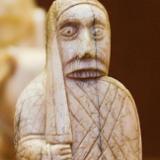
The Lewis Chessmen form a remarkable group of iconic objects within the world collection of the British Museum. They were probably made in Norway, about AD 1150- 1200. At this period, the Western Isles, where the chess pieces were buried, were part of the Kingdom of Norway, not Scotland. It seems likely they were buried for safe keeping on route to be traded in Ireland.
The chess pieces testify to the strong cultural and political connections between Britain and Scandinavia in the Middle Ages, and to the growing popularity within Europe of the game of chess, the origins of which lie in ancient India.
Of the 93 pieces known to us today, 11 pieces are in Edinburgh at the National Museum of Scotland, and 82 are in the British Museum. The chess pieces consist of elaborately worked walrus ivory and whales' teeth in the forms of seated kings and queens, bishops, knights on their mounts, standing warders and pawns in the shape of obelisks.





